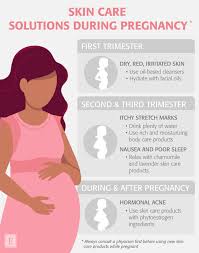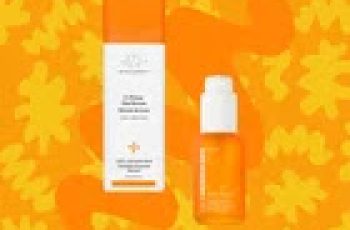Pregnancy Skin Care Tips
Only when you’re pregnant do you realize how much of an impact hormones have on your body. The skin changes in many ways, from increased pigmentation (also known as the pregnancy mask) to dry skin, increased sensitivity to certain ingredients or products, and increased redness. All of these changes are inevitable, but luckily, they pass once the baby is born. But for now, we want to give you some pregnancy skin care tips.
What skin care products should you use during pregnancy?
Fortunately, there are many skin care products that are safe to use during pregnancy and can help treat the skin changes mentioned earlier. Here is a list of ingredients you need to keep or add to your routine during pregnancy:
Glycolic Acid – While it’s not recommended to be consumed in large quantities during pregnancy, glycolic acid is one of the AHAs that is powerful enough to remove dead skin cells, bacteria, dirt, and excess oil while remaining gentle on the skin. Try using a chemical peel once a day, preferably at night, to prevent your skin from looking dull and lifeless.
Vitamin C – Vitamin C is a powerful antioxidant that protects the skin from damaging free radicals. Since collagen production is also stimulated, your complexion will appear more radiant and youthful.
Hyaluronic Acid – Skin can become noticeably dry during pregnancy and using effective hyaluronic acid can lock in moisture, leaving skin looking hydrated, healthy and youthful.
Vitamin E – If your belly starts to grow, you may develop stretch marks. Then vitamin E can help. Use a moisturiser enriched with vitamin E every day to nourish the skin, especially if it becomes dry.
Sun protection – Skin sensitivity can also cause the skin to react to excessive sun exposure. Always use a high SPF and apply daily to avoid sun damage or increased skin pigmentation.
If you are completely happy with the way your skin looks and feels, stick with your current skincare routine as it is clearly working for you. However, it is advisable to consider any ingredients that are unsafe to use and should be excluded from your skincare routine throughout your pregnancy.
What skincare products should you avoid during pregnancy?
The following ingredients should be avoided during pregnancy and even after the baby is born. If you have any questions about the use of skincare products and their ingredients, it is best to consult a GP or dermatologist for further advice.
Retinoids
Retinol is considered the holy grail of all skincare ingredients, reversing signs of aging, reducing acne like blackheads, and exfoliating faster than the likes of AHAs. While all of this sounds amazing, taking retinol during pregnancy can increase the risk of birth and child defects. Multiple studies have linked it to exposure to high levels of vitamin A (retinol). Due to the risks to the baby and increased hyperpigmentation and signs of sun damage, it’s best to avoid retinol altogether.
Phthalates
These chemicals are found in perfumes and nail polishes, and studies have shown that they may be linked to birth defects. Fortunately, there are multiple brands of products that do not contain these chemicals and clearly state on their labels that they are safe to use during pregnancy.
Ammonia
Ammonia, commonly found in hair dyes, has carcinogenic properties that must be avoided, especially during the first trimester of pregnancy. Then, consult your colorist to find out which ammonia-free products are safe to use.
Some Essential Oils
Although many essential oils are natural, they must be used with caution during pregnancy. Some essential oils are known to increase the skin’s sensitivity to UV rays. Add to that the fact that your skin is more susceptible to hyperpigmentation, and it’s not an ideal situation. Rosemary, mint, jasmine, basil, and cypress are essential oils that should be avoided at all costs, as their use on the skin can increase the risk of miscarriage.
These are some of the key ingredients you should avoid in your skin care routine to ensure your safety during pregnancy. Other treatments and procedures to avoid include injectables, fillers or “tweaks,” and spray tans, as dihydroxyacetone is inhaled during treatment.
What helps combat dull skin during pregnancy?
To prevent your skin from becoming too dull during pregnancy, here are some tips to keep your skin glowing:
Exfoliation
Exfoliation will make your skin look fresh and radiant, but be careful as increased redness can be one of the changes in your skin and should not be irritated. Use a scrub or tonic with glycolic acid 1-2 times a week.
Serums
A serum with vitamin C and hyaluronic acid can be your skin’s best friend by nourishing the skin, locking in moisture, and fighting free radicals and other skin-damaging factors.
Water
Drinking enough water throughout the day will not only keep your baby and your body healthy, but your complexion will also look youthful, fine lines and wrinkles will be reduced, and your skin will regain its radiance.
SPF
Using SPF sunscreen every day will protect your skin from the sun, which can dry out your face and increase fine lines and wrinkles due to lack of moisture in your skin.
There are some skin care tips and tricks for pregnancy. We strongly recommend not introducing any new ingredients or products into your skin care routine and seek the advice of a dermatologist before using them. For now, it’s best to take care of your baby and of course yourself during this special time. There’s nothing wrong with preparing for postpartum pampering days once it’s safe to use these ingredients again. After all, you deserve it!
DQH Knowledge drop: In your 20s, your skin cell turnover decreases. (Cell turnover is a key component in keeping your skin youthful.) You know what else slows down? Your collagen production. Starting in your 20s, collagen decreases by about 1 percent per year. Should you want to prevent fine lines and wrinkles, start by eliminating behaviors that contribute to premature aging. “If it’s bad for you, it’s bad for your skin,” says dermatologist Michel Somenek.
“Cigarette smoking reduces blood flow to the skin and causes premature wrinkling and a dull skin texture. Making the repeated pursed motion to inhale can also cause smoker’s lines. Alcohol and recreational drugs are toxins for the skin that damage its cellular structure and DNA,” Somenek tells us. “The faster you eliminate vices while you are young, the better chance your skin and body have to recuperate.” Also, adopting an anti-aging routine in your 20s is key. After all, the best offense is a good defense. We spoke to Somenek and experts Joshua Ross and Audrey Kunin to find out more.
Keep reading for the best anti-aging products for your 20s, according to skincare professionals.
Sunscreen
“We all know that the sun is the number one cause of skin aging and starting the prevention in your 20s is very important,” Ross says. “The majority of your sun damage won’t start to appear until you’re in your 30s, so don’t wait until you see it surface or you’ll be behind the curve. Stay ahead of it with a good-quality zinc-based sunscreen worn daily.”
Farmacy Green Defense Daily Mineral Sunscreen
An invisible sunscreen with SPF 30, plus botanical extracts meant to protect skin with tons of antioxidants. Bonus: It’s clean and fine to use under makeup.
Bareminerals Complexion Rescue™ Tinted Moisturizer Broad Spectrum SPF 30
Although we recommend you use your SPF and moisturizer separately, we also understand moments when you don’t have time or energy for that extra step. For those times, this bareMinerals moisturizer is a great thing to have on hand.
Vitamin C Serum
“A great introduction to anti-aging is to start with a vitamin C serum in your morning skincare routine,” Ross says. “It’s a powerful antioxidant that will neutralize free radicals and brighten the skin.” He adds that it’s a great way to counteract the effects of the sun’s harmful rays, which, as previously mentioned, are among the biggest causes of premature aging.
Drunk Elephant C-Firma™ Vitamin C Day Serum
The Drunk Elephant C-Firma is a lightweight serum that promises to give skin a glow by combining the brightening powers of vitamin C with ferulic acid, l-ascorbic acid, and vitamin E. The included sodium hyaluronate is meant to replace hydration loss, so you shouldn’t have to deal with any irritation.
Sunday Riley C.E.O. Rapid Flash Brightening Serum
This potent serum is jam-packed with vitamin C (15 percent, to be exact), which means it’s a potential superstar at both brightening skin and dousing it in antioxidants.
Peptides
Using peptides on your skin has many benefits, says Somenek. “The skin barrier is what defends the body against pollution, UV rays, bacteria, and toxins. It can be damaged by several everyday factors. Using topical peptides aids in building a stronger barrier,” he says. “Peptides comprise elastic fibers, which are a type of protein. These fibers help to make skin appear taut and firm. Peptides can also help repair damaged skin, relieve inflammation, and even out skin tone. Some peptides can kill acne-causing bacteria that is common in 20-somethings.”
Kunin agrees, saying, “Peptides are an excellent entry point for supporting collagen.” She recommends looking for face and eye treatments that contain these collagen-boosting powerhouses.
Charlotte Tilbury Magic Eye Rescue Cream
This Charlotte Tilbury super-emollient eye cream has a base of coconut oil and shea butter (read: it’s incredibly hydrating). Botanicals plus peptides are meant to help reduce dark circles and boost collagen, respectively.
This creamy moisturizer serves up potent collagen-boosting peptides and pycnogenol, and antioxidant-rich vitamin C. “Instead of sitting on top of the skin, peptides penetrate the outer layer so they go deep. The ‘signals’ they send tell the cells to produce elastin and collagen, which are needed for youthful-looking skin,” explains Somenek.
At-Home Peel Pads
Remember that skin cell turnover fiasco we talked about earlier? One way to help support it is by exfoliating. “Exfoliation is important to help keep skin fresh and luminous,” Kunin says. She recommends using at-home peel pads as an easy and effective way to exfoliate.
“The goal in your 20s is to fight the slowing pace of cell turnover. It is wise to use products that gently exfoliate, yet still remove oil and other impurities. Products that have Alpha Hydroxy Acids (AHA) or Beta Hydroxy Acids (BHA) are a good choice.”
According to Somenek, you should only exfoliate two to three times a week. “People of all ages are guilty of over-exfoliating and that can be too much of a good thing,” he says.
Dermadoctor Kakadu C Intensive Vitamin C Peel Pad
A few swipes of this Derma Doctor powerful peel pad promise to leave your skin glowing and smooth, thanks to the seven (yes, seven) types of chemical exfoliants, including AHA and BHA. It also contains vitamin C via Kakadu plum extract for added brightening and antioxidant protection.
KEY INGREDIENTS Kakadu plum extract is sourced from the Kakadu plum, a fruit grown in northern Australia. It contains vitamin C, which restores the skin’s natural barrier, increases collagen production, and soothes irritation.
Dr. Dennis Gross Skincare Alpha Beta® Universal Daily Peel Pads
These are the gold standard of peel pads, with a cult following and over 900 five-star reviews on Sephora. They’re easy to use and contain a blend of anti-aging exfoliating acids.
Emollient Night Cream
“In your 20s, you need to start upping the hydration in your skincare routine. You may have been cautious of over-moisturizing because of acne in your teens, but as you enter your 20s, your skin transitions and becomes drier,” Ross says. “I recommend an emollient night cream added into your evening skincare regimen.”
“Twenty-somethings need to make sure that they are not using creams that will clog their pores and cause excess oil production,” says Somenek. Opt for non-comedogenic products.
Cerave Skin Renewing Night Cream
One great choice is the CeraVe Skin Renewing Night Cream, which is a non-comedogenic night cream that leaves skin soft and glowy. It combines the moisturizing powers of ceramides and hyaluronic acid.
RoC Retinol Correxion Max Hydration Creme
“The best night cream ingredients contain retinol, benzoyl peroxide, and/or salicylic acid or hyaluronic acid. The goal is to moisturize, yet remove excess oil,” says Somenek. This Roc Retinol Correxion cream fits the bill as it contains both hyaluronic acid and retinol so it promises to moisturize while also being non-comedogenic.



